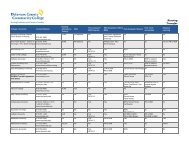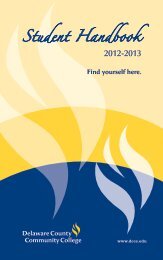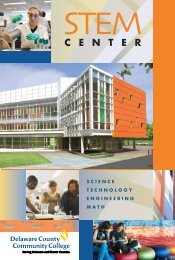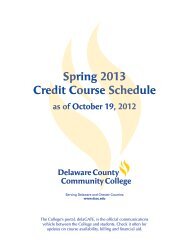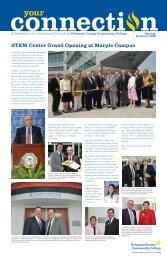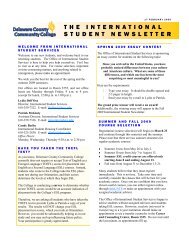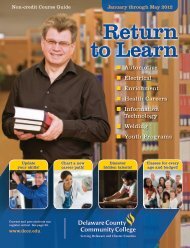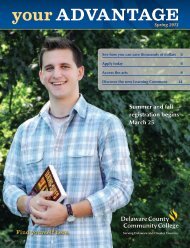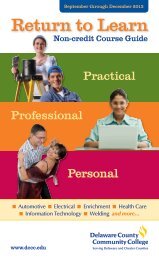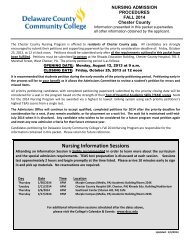2010 Catalog - Delaware County Community College
2010 Catalog - Delaware County Community College
2010 Catalog - Delaware County Community College
You also want an ePaper? Increase the reach of your titles
YUMPU automatically turns print PDFs into web optimized ePapers that Google loves.
COURSE DESCRIPTIONS 111<br />
Upon successful completion of this course, students<br />
should be able to:<br />
• Distinguish between poisoning by ingestion, inhalation,<br />
and injection.<br />
• Recognize conditions relating to drug and alcohol abuse.<br />
• Identify key components and normal functions of the<br />
urinary system.<br />
• Describe detailed pathophysiology and assessment of<br />
urinary system disorders.<br />
• Identify abdominal and genitourinary disorders, acute<br />
abdominal pain, and systemic illnesses.<br />
• Apply management and treatment priorities for<br />
toxic syndromes.<br />
• Discuss the pathophysiology of blood and hematological<br />
disorders.<br />
• Apply the theory of thermoregulation to various<br />
patient presentations.<br />
• Distinguish among the recognition, transmission, and<br />
pathophysiology of infectious diseases.<br />
• Discuss the individual's (student paramedic) role in the<br />
prevention of disease transmission.<br />
• Discuss the critical principles of behavior emergencies.<br />
• Identify potential causes of behavioral and<br />
psychiatric illnesses.<br />
• Distinguish varied methods of approaching violent and<br />
non-violent patients (adult or child).<br />
• Describe the physiologic process of menstruation and<br />
ovulation.<br />
• Describe the structure and function of processes during<br />
pregnancy.<br />
• Describe detailed assessment and management of<br />
obstetrical and gynecological emergencies.<br />
4 Credits 3 Weekly Lecture Hours<br />
2 Weekly Laboratory Hours<br />
EMS 220<br />
Concepts and Practices I<br />
This course is designed for the student who is prepared<br />
to participate in clinical experiences which should occur<br />
after the student has demonstrated competence in skills<br />
and knowledge in the didactic and laboratory components<br />
of the program. The student will have the opportunity to<br />
achieve proficiency by performing skills on actual patients<br />
in a clinical setting. Alternative learning experiences<br />
(simulations, programmed patient scenarios, etc.) will be<br />
developed. Proficiency in performing all steps and<br />
procedures safely and properly will be thoroughly<br />
discussed.<br />
Upon successful completion of this course, students<br />
should be able to:<br />
• Demonstrate safe practices in the pre-hospital environment.<br />
• Demonstrate the ability to serve as a team leader in a<br />
variety of pre-hospital emergency responses.<br />
• Recognize the need for advanced life support interventions.<br />
• Demonstrate the proper application and performance of<br />
basic life support skills.<br />
• Demonstrate proper performance of advanced life support<br />
procedures and skills.<br />
• Apply the appropriate advanced life support skills in an<br />
emergency situation.<br />
6 Credits 4 Weekly Lecture Hours<br />
4 Weekly Laboratory Hours<br />
EMS 221<br />
Concepts and Practices II<br />
This course is a continuation of Paramedic Concepts and<br />
Practices I and will incorporate the skills and practices that<br />
each student would need to accomplish during the inhospital<br />
and field time clinical sessions. The clinical<br />
document outlines the specific encounters with the patient<br />
that each student must successfully achieve during clinical<br />
and hospital sessions. In addition, topics such as intravenous<br />
medication bolus through intravenous line, communicating,<br />
relaying patient information, and trauma will be discussed,<br />
as well as numerous miscellaneous procedures.<br />
Upon successful completion of this course, students<br />
should be able to:<br />
• Perform a comprehensive identification, assessment and<br />
management of a variety of advanced life support<br />
patients in the in-hospital and pre-hospital settings.<br />
• Demonstrate knowledge of communication systems for<br />
reporting patient care and interventions.<br />
• Demonstrate appropriate patient communication techniques.<br />
• Document all patient assessments and advanced life<br />
support interventions accurately.<br />
• Maintain equipment and vehicles in a ready state of<br />
response for all types of emergency conditions.<br />
6 Credits 4 Weekly Lecture Hours<br />
4 Weekly Laboratory Hours<br />
ENG 025<br />
(ENG) English<br />
Basic & Essential Writing<br />
This course is designed for students who have knowledge<br />
of sentence structure. The purpose of this course is to<br />
develop writing skills. Students will start with a focus on<br />
writing clear, Standard English sentences with appropriate<br />
use of grammar, punctuation, and spelling and will<br />
progress to writing short paragraphs.<br />
Upon successful completion of this course, students<br />
should be able to:<br />
• Comprehend verbal and written directions.<br />
• Identify the parts of speech.<br />
• Analyze the structure of sentences.<br />
• Construct simple and compound sentences with<br />
appropriate usage, punctuation and spelling.<br />
• Demonstrate improvement in written vocabulary.<br />
• Brainstorm effectively.<br />
• Recognize and correct common errors in usage,<br />
punctuation, and sentence structure.<br />
• Analyze the structure of a paragraph.<br />
• Outline and write a short paragraph with a main idea<br />
and supporting details.<br />
• Combine simple sentences correctly.<br />
3 Credits 3 Weekly Lecture Hours<br />
ENG 050<br />
Developmental English<br />
Comprehensive review and writing practice in the fundamentals<br />
of English grammar, work choice, punctuation,<br />
and paragraph construction. Students may test out of this<br />
course at any time in accord with <strong>College</strong> policy and with<br />
the agreement of their instructor. Credits from the course<br />
are not applicable toward a degree.<br />
Upon successful completion of this course, students<br />
should be able to:<br />
• Writes a paragraph of substantial length.<br />
• Identifies a sufficiently limited topic.<br />
• Provides a topic sentence containing an appropriately<br />
limited subject and controlling idea.<br />
• Demonstrate clear awareness of purpose by using an<br />
applicable paragraph pattern.<br />
• Integrates a body of relevant and specific details with a<br />
consistent point of view, effective transitions, and a<br />
concluding sentence - all elements working to keep the<br />
paragraph clearly focused on the topic.<br />
• Applies conventional punctuation, capitalization, spelling<br />
and grammar practices regularly enough so as not to<br />
frustrate readers or repeatedly distract them from the<br />
content of the paragraph.<br />
• Employs a range of sentence variety relevant to audience<br />
and purpose.<br />
• Understands that writing is a process and is able to<br />
identify and use steps in the process to produce<br />
successful paragraphs.<br />
• Recognizes the multi-paragraph essay format and<br />
understands its similarities to single paragraph writing.<br />
Prerequisite: Placement testing determines the correct<br />
beginning course for each DCCC writing student. Many<br />
students place directly into ENG 050 upon entry into the<br />
<strong>College</strong>.<br />
If students must begin writing instruction at a simpler<br />
remedial level, they will be placed into ENG 025: Basic and<br />
Essential Writing. Students who are required to take ENG<br />
025 must pass that course before beginning ENG 050<br />
Students who are required to take REA 050, Reading II,<br />
must pass that course and ENG 050 before they are eligible<br />
for ENG 100<br />
ESL students must pass ELS 044, Intermediate Writing II<br />
before beginning ENG 050.<br />
3 Credits 3 Weekly Lecture Hours<br />
ENG 100<br />
English Composition I<br />
This course reviews the principles of composition,<br />
including rhetoric, grammar and usage, and emphasizes<br />
the writing of analytical essays and the study of principles<br />
underlying critical thinking.<br />
Upon successful completion of this course, students<br />
should be able to:<br />
• Demonstrate effective writing strategies after reading and<br />
assessing a variety of texts.<br />
• Write assignments that consider various writing<br />
situations in terms of audience, purpose, tone,<br />
organization, format, style, point of view, and diction.<br />
• Generate ideas, limit a topic, and formulate a thesis,<br />
utilizing prewriting techniques.<br />
• Provide specific, concrete details to support the thesis.<br />
• Organize essays using appropriate types of development<br />
such as description, narration, definition,<br />
comparison/contrast, causal relationship, classification,<br />
example, process analysis, and argumentation.<br />
• Compose an original, unified, multi-paragraph essay with<br />
introduction, conclusion, and transitions.<br />
• Revise, edit, and proofread writing to produce final<br />
drafts with a minimum of errors in grammar, mechanics,<br />
and diction.<br />
• Access and evaluate source material using current<br />
information literacy techniques.<br />
• Summarize, paraphrase, and quote source material using<br />
MLA documentation.<br />
• Prepare a documented essay free of plagiarism.<br />
Prereq. ENG 050 and REA 050<br />
3 Credits 3 Weekly Lecture Hours<br />
ENG 112<br />
English Composition II<br />
Composition II is a writing course with emphasis on<br />
both literature and research. The course develops critical<br />
thinking through the study of literature, the use of<br />
advanced research techniques, and the writing of<br />
analytical/critical and researched essays. Upon successful<br />
completion of this course, students should be able to:<br />
• Formulate an analytical/argumentative thesis.<br />
• Express ideas logically and clearly in a coherent essay<br />
with sound, supportive data.<br />
• Compose original, analytical/critical essays in response<br />
to literature.<br />
• Analyze the short story, poetry and drama using the<br />
elements of literature such as plot, setting, character,<br />
point of view, form, tone, style, symbolism, and theme,<br />
from different critical perspectives.<br />
• Access and evaluate source material using current<br />
information literacy skills.<br />
• Summarize, paraphrase, quote and synthesize source<br />
material using MLA documentation.<br />
• Apply research skills by composing a multi-source paper<br />
that proves a scholarly thesis and is free of plagiarism.<br />
• Revise, edit, and proofread to produce polished, final<br />
drafts with a minimum of errors in grammar, mechanics<br />
and diction.<br />
Prereq. ENG 100<br />
3 Credits 3 Weekly Lecture Hours




